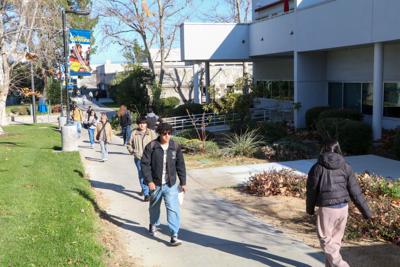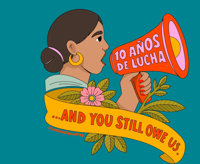
This story was originally published by EdSource. Sign up for their daily newsletter.
Entering her senior year at Dinuba High School in California’s Central Valley in 2022, Sarahi Sanchez Soto wasn’t sure if she would attend college.
Nobody else in her family had a postsecondary degree. Her older sister previously enrolled in college but dropped out, leaving Soto discouraged about her own prospects and wondering if she could handle college.
Her plans changed that fall, when a counselor introduced her to a dual enrollment program in information systems with nearby Reedley College. By enrolling in the program, high school students get access to a state-of-the-art computer lab in Dinuba’s downtown area, where they take college-level classes in web development. The program even has a dedicated counselor, who Soto said connected her to resources, including a food pantry and a math tutoring center on the Reedley campus.
That experience led Soto to enroll after high school at Reedley, where she is now studying computer science and information studies and intends to transfer to a four-year university.
Both the lab and a dedicated counselor were funded by a Hispanic-Serving Institution (HSI) grant, through a federal program available to colleges where Hispanic students make up at least 25% of enrollment.
But now, the future of the program and other initiatives funded by HSI grants are in peril. The Trump administration is eliminating the grant programs for HSIs and other Minority-Serving Institutions (MSI). In announcing the cuts last month, U.S. Secretary of Education Linda McMahon said the grants “discriminate by restricting eligibility to institutions that meet government-mandated racial quotas.”
“Diversity is not merely the presence of a skin color. Stereotyping an individual based on immutable characteristics diminishes the full picture of that person’s life and contributions, including their character, resiliency, and merit,” McMahon added at the time.
Much of the recent tension between the Trump administration and higher education has focused on cuts to top-flight science and medical research at elite universities. In contrast, for the state’s community colleges, which don’t conduct research, the HSI and MSI grant cuts are the most impactful federal cut yet. Those reductions will directly affect services meant to support students like Soto as they get past early hurdles in their college journeys.
At least 97 of the state’s 115 brick-and-mortar community colleges are designated as HSIs. The colleges with active grants have until next year to spend any funds that they have already received. They won’t get any more funding after that.
In total, the California community colleges stand to lose about $20 million next year in federal grants that fund key programs. Being designated as an HSI makes a college eligible for grants, which have a competitive application process and are not guaranteed.
Soto said she wouldn’t be on her current path without the dual enrollment program and the resources that came with it. She hopes other students will be able to get similar hands-on assistance.
“Once I started doing this program, I started noticing that the college course material was something that I could do,” Soto said. “It wasn’t difficult. And if it was difficult, I had these support systems that were able to help me.”
The State Center Community College District, home to Reedley and three other colleges, has set aside $4 million of its own budget to cover lost federal funding. The district’s total operating budget is about $500 million. In the short term, the money set aside to mitigate federal losses will keep the dual enrollment program and other initiatives funded by HSI grants up and running.
“We’ve been preparing for this,” said Carole Goldsmith, chancellor of the district. “I’m not sure all districts are in a financial place where they could do this sort of thing. But we’ve been planning for a rainy day, and this certainly is that rainy day.”
But without federal funding, the long-term future of the programs are in question.
Reedley is one of many community colleges across the state trying to figure out what’s next for a variety of initiatives funded by HSI and other MSI grants. Projects now at risk include a guided pathways program at Las Positas College in Alameda County, efforts to eliminate equity gaps at Glendale Community College, and extra support for students pursuing STEM degrees at College of the Canyons in Los Angeles County.
Sonya Christian, the statewide chancellor for the community colleges, said she has asked local district and college presidents to look at their budgets to determine how they can continue offering services that had been funded by federal grants now in jeopardy. The current state budget also includes a $60 million block grant, to be divided among the community colleges, that is meant to mitigate federal cuts.
“We have to support our students,” she said in an interview. “Our colleges are scrambling to figure out how they can have continuity in the services that we have promised.”
The state’s four-year universities are also impacted by the HSI grant cuts. All but one of the California State University’s 22 campuses are designated as HSIs, as are five of the nine University of California undergraduate campuses. Several private universities around the state also have the designation. Many of those campuses receive HSI grants, but in general, the bigger concern for those bachelor- and advanced degree-granting institutions is the separate threat of losing significant federal research funding.
In addition to cutting the HSI grants, the Trump administration also eliminated grant programs for other Minority-Serving Institutions, including colleges enrolling high numbers of Alaska Natives and Native Hawaiian students, Asian American students, and Black students. The cuts amounted to a total of $350 million nationwide, which the administration said it is redirecting to what are formally known as historically Black colleges and universities (HBCUs) — a separate group of mainly older schools that were founded in reaction to segregation — as well as to tribal colleges.
Chancellor Christian’s office is also in discussions with Gov. Gavin Newsom’s office, the state Attorney General’s Office, and legislators as they explore the potential for a state-based HSI grant.
Christian defended the HSI grants against the Trump administration’s claims that they are discriminatory and unconstitutional. She said that while colleges qualify for grants based on their demographics, the initiatives that get funded are open to all students. “It’s inclusionary,” she said. “It’s not exclusionary.”
This month, College of the Canyons was supposed to be entering the third year of a five-year, $3 million HSI grant. Among other initiatives, the grant funded a counselor position and the creation of Project SOL, a program designed to support students pursuing a degree in science, technology, engineering or math. It’s tailored toward Latino students but is open to any student.
About 300 students are participating this fall in the program, which will continue to operate at least through December. Students get access to extra counseling, STEM-focused workshops and on-campus events, such as panel discussions featuring professionals in STEM.
Mireya Milian, a counselor in the program, said she is still figuring out what’s next for Project SOL. The college plans to find a new home for the program, but it likely won’t get as much funding beyond this year.
“I have to totally go back to the drawing board,” she said.
College officials were especially disappointed by the timing of the Trump administration’s decision. Erica Seubert, the coordinator for HSI programs at College of the Canyons, said the college had learned a lot through the first two years of the grant funding and was “gaining a lot of momentum” entering the third year.
“Things were really starting to click,” she said. “So it’s really heartbreaking in that sense because we were just getting started.”
Soto, the Reedley student, said she worries that other students across California won’t get the same opportunities as she did and might be left thinking that college isn’t for them.
“I can’t even fathom it,” she said. “These resources had such a big impact on me, and now you’re cutting those connections for future students.”











(0) comments
Welcome to the discussion.
Log In
Keep it Clean. Please avoid obscene, vulgar, lewd, racist or sexually-oriented language.
PLEASE TURN OFF YOUR CAPS LOCK.
Don't Threaten. Threats of harming another person will not be tolerated.
Be Truthful. Don't knowingly lie about anyone or anything.
Be Nice. No racism, sexism or any sort of -ism that is degrading to another person.
Be Proactive. Use the 'Report' link on each comment to let us know of abusive posts.
Share with Us. We'd love to hear eyewitness accounts, the history behind an article.